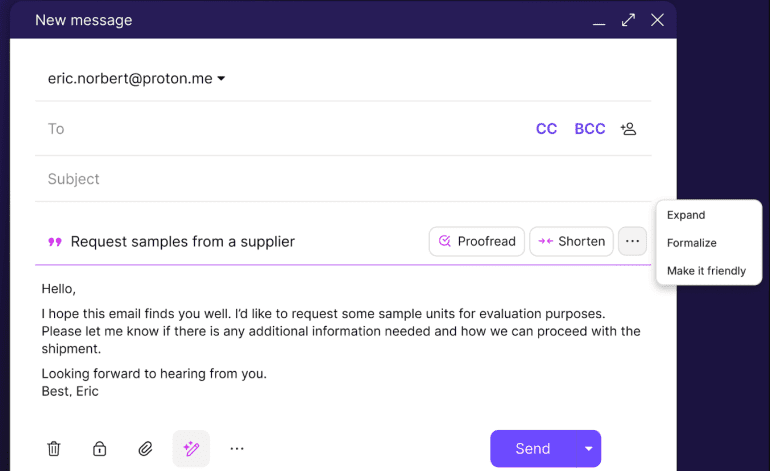- Proton introduces Proton Scribe, an AI-powered writing assistant focused on email composition and privacy.
- Built on Mistral 7B, an open-source model, ensuring transparency and security audits under GPL-3.0.
- Operates entirely on-device, addressing data privacy concerns by keeping user data local.
- Offers optional server deployment for faster performance, while still prioritizing user privacy.
- Includes features like quick actions for tone adjustment and content refinement.
- Initially available for Proton Mail on web and desktop, with mobile compatibility planned.
- Business users on select Proton Mail plans can access for $2.99/month; free for legacy plan users.
Main AI News:
Proton, renowned for its suite of privacy-centric apps spanning email, VPN, password management, and more, has unveiled a cutting-edge AI-powered writing assistant aimed at revolutionizing email composition and privacy. Named Proton Scribe, this innovative tool not only assists users in drafting, revising, and proofreading emails with simple prompts but also ensures all processing occurs locally on the user’s device.
In a strategic move to rival industry leaders like Google, which recently introduced its Gemini AI for Gmail, Proton Scribe leverages Mistral 7B, an open-source language model from French AI startup Mistral. This choice underscores Proton’s commitment to transparency and security by allowing third-party security and privacy audits under the GPL-3.0 license.
The emphasis on local processing addresses prevalent concerns regarding data privacy and security, particularly in enterprise environments where safeguarding sensitive information is paramount. By keeping user data within their devices, Proton not only mitigates risks associated with third-party AI providers but also ensures a streamlined user experience without compromising on privacy.
For those preferring enhanced speed and performance, Proton Scribe can also operate on Proton’s servers, though the company maintains its stringent privacy standards by minimizing data transmission and ensuring no retention of user data post-draft creation. This dual deployment approach caters to diverse user needs, offering flexibility without compromising on privacy principles.
Proton Scribe’s functionality extends beyond basic email drafting; it includes features like quick actions for tone adjustments, proofreading, and content refinement, enhancing user productivity and ensuring email clarity. While the current iteration focuses on email, Proton hints at future integrations with its collaborative document editing app and potentially other products based on user demand.
Available initially for Proton Mail on web and desktop platforms, with plans for mobile compatibility in the pipeline, Proton Scribe targets business users primarily, priced at an additional $2.99 per month for selected Proton Mail plans. Users on legacy plans such as Visionary or Lifetime enjoy complimentary access, with potential expansions to broader consumer plans anticipated in the future.
Conclusion:
Proton’s launch of Proton Scribe represents a strategic move to integrate AI into email productivity tools while maintaining rigorous data privacy standards. By offering both local and server-based deployment options, Proton caters to varying user needs, positioning itself as a leader in providing secure and efficient AI-driven solutions for business communication. This initiative underscores a growing market demand for privacy-centric technology solutions amidst increasing concerns over data security.

